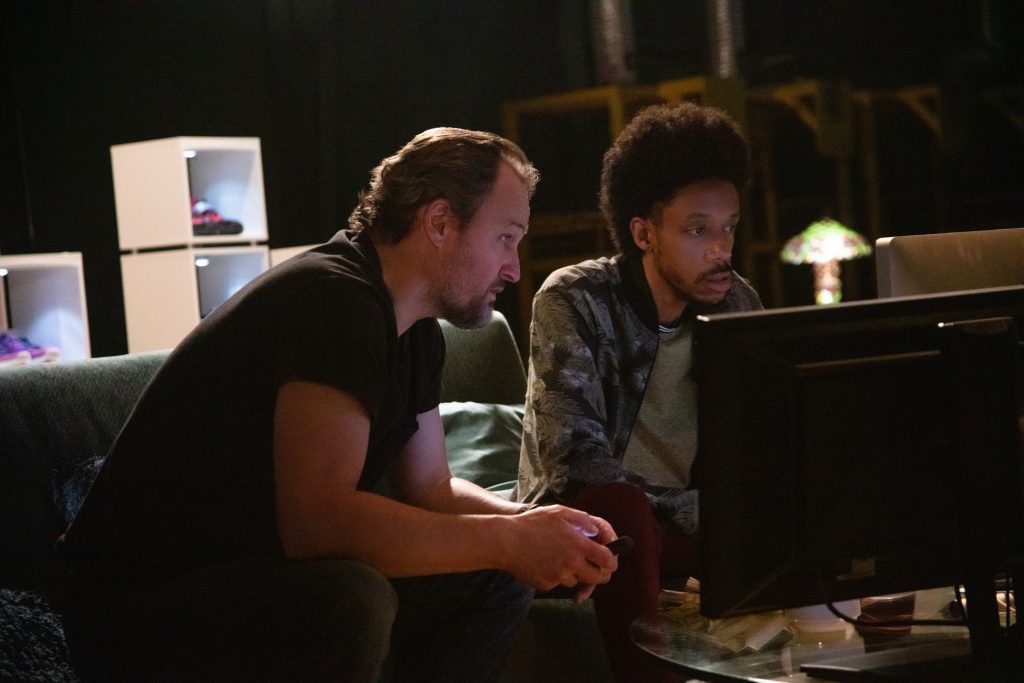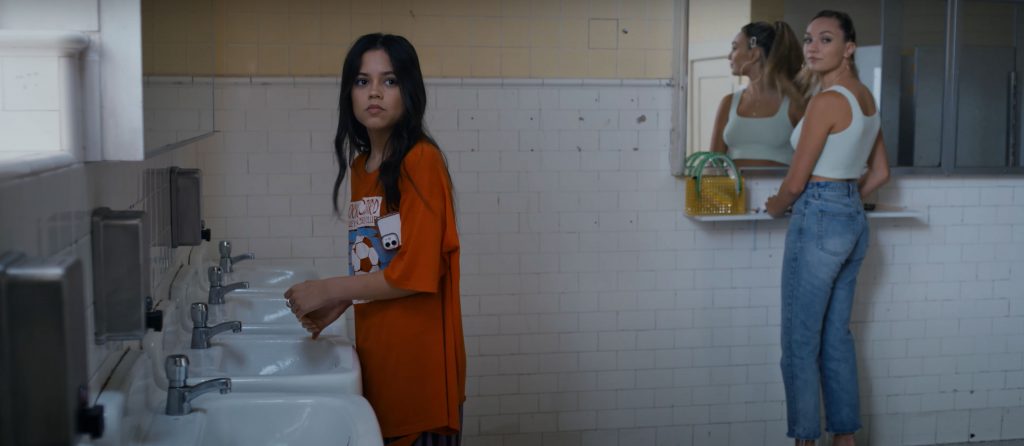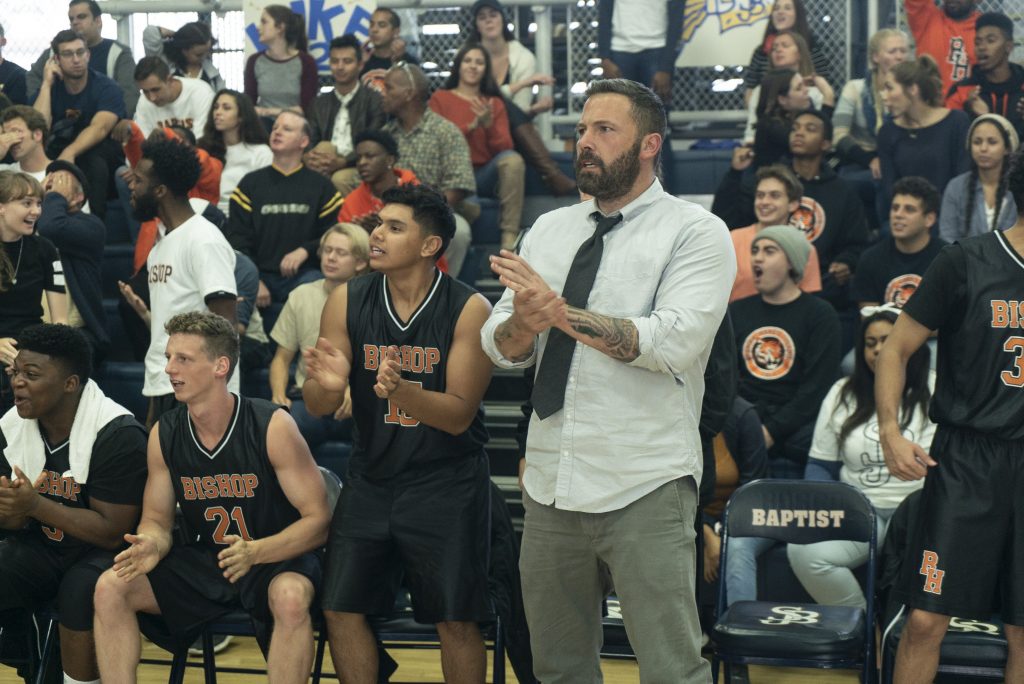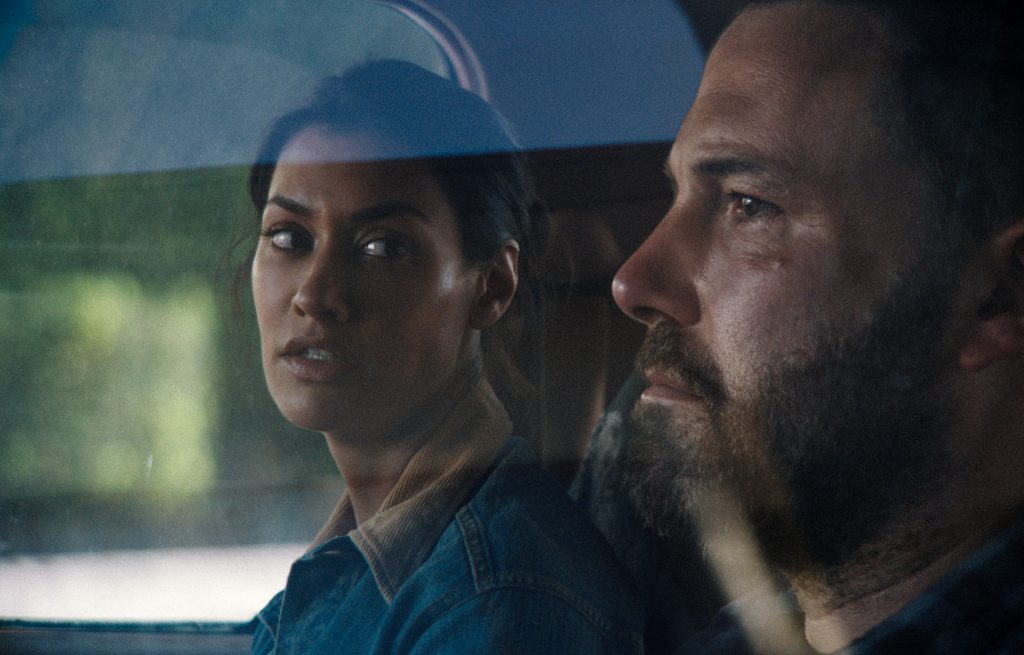March 29, 2021
by Carla Hay

Directed by Tiller Russell
Culture Representation: Taking place in Baltimore, Austin, San Francisco and briefly in Utah and Australia from 2010 to 2013, the crime drama “Silk Road” features a predominantly white cast of characters (with some African Americans, Asians and Latinos) representing the middle-class and criminal underground.
Culture Clash: Based on real events, a rebellious young man becomes a multimillionaire after starting a darknet website called Silk Road, which becomes a popular destination to buy illegal items, and he becomes the target of FBI and DEA stings after bragging about the website in media interviews.
Culture Audience: “Silk Road” will appeal to people who are interested in true crime movies that have good acting but are ultimately predictable and formulaic.

Even if you didn’t know that the crime drama “Silk Road” is based on a true story, it’s very easy to see within the first 10 minutes of the film that the main character is going to get busted for something major and illegal. “Silk Road” (written and directed by Tiller Russell) is the dramatic retelling of what happened when a brash tech entrepreneur named Ross Ulbricht launched a darknet website called Silk Road as an online marketplace to sell illegal items through cryptocurrency—just because he didn’t feel like working in an honest job.
It’s a tale of hubris and greed that’s somewhat oversimplified in this film. “Silk Road” has solid performances from most of the cast members, but also too many eye-rolling moments of melodrama that were obviously fabricated for the movie. The movie gets a lot of elements wrong in how the U.S. Drug Enforcement Agency (DEA) investigated this case.
Most people who’ve heard of Silk Road associate it with sales of illegal drugs. However, the website was also known for many other types of sales, such as illegal weapons, stolen identity information and even the services of assassins. When Ulbricht was arrested in San Francisco in 2013, at the age of 29, Silk Road had been operational for two years, and his net worth was estimated at $28 million, according to Forbes.
In 2015, Ulbricht was convicted of money laundering, computer hacking, conspiracy to traffic fraudulent identity documents and conspiracy to traffic narcotics by means of the Internet. That same year, he was sentenced to a double life sentence plus 40 years without the possibility of parole. Ulbricht and his supporters have been trying to get his prison sentence reduced.
All of this information has been widely reported. And therefore, many people watching this movie will already know what happened to Ulbricht and his punishment in real life. Viewers of “Silk Road” will mainly watch out of curiosity to see what led to Ulbricht’s rapid rise as a cybercriminal and how it all came crashing down on him.
However, the “Silk Road” movie spends almost as much time on the story of a fictional DEA agent named Rick Bowden (played by Jason Clarke), who ends up playing a “cat and mouse” game in his quest to bust Ulbricht. Nick Robinson portrays Ross Ulbricht with the expected mix of cockiness and insecurity that’s typical of people who commit these audacious crimes. The Rick Bowden character, who has a quick temper and a troubled soul, is supposed to be a composite of real-life law enforcement agents who worked on the Ulbricht investigation.
Clarke is a very good actor, but the movie’s deep dives into Rick’s personal life, including his alcoholism and marital problems, just seem superfluous and don’t leave much room to answer a lot of questions about Ulbricht. Do viewers really need to know that Rick has a special-needs daughter at home and is worried about how to pay for tuition to a private school that can better handle her needs? No.
There’s a disclaimer in the movie’s intro that cheekily reads: “This story is true. Except for what we made up and changed.” Writer/director Russell’s “Silk Road” is based on David Kushner’s 2014 Rolling Stone magazine article “Dead End on Silk Road: Internet Crime Kingpin Ross Ulbricht’s Big Fall.” This movie is not to be confused with director Mark de Cloe’s 2017 Norwegian “Silk Road” movie that covered the same topic.
In the movie’s opening scene, which takes place in San Francisco in 2013, Ross makes his way to a public library as he says in a voiceover: “For years, I was frustrated by what seemed to be insurmountable barriers between the world as it is and the world I wanted. So, I began making a website where people could buy and sell anything anonymously.”
Ross continues, “Silk Road is about something much bigger than thumbing your nose at ‘the man.’ It’s about taking back our liberty. As corny as it sounds, I just want to look back on my life and know I did something that helped people.” As he sits down at a library desk with his laptop computer, Ross gets a phone call. And then, the movie goes into flashback mode. It’s at this point you know that the movie will go back to this library scene because it has something to do with his arrest.
“Silk Road” jumps back and forth in the timelines for Ross and Rick, as if to show how these two men’s lives eventually collide. (The movie takes place from 2010 to 2013.) In 2010, Ross was a well-educated, aspiring entrepreneur living in his hometown of Austin, Texas. He was a graduate of the University of Texas at Dallas (he graduated in 2006 with a bachelor’s degree in physics) and Pennsylvania State University (he graduated in 2009 with a master’s degree in materials science and engineering), but his career was floundering with some failed business ventures, including a mobile bookstore called GoodWagon.
During this time in his life, Ross declared himself to be a Libertarian. He was also a devotee of the iconoclastic political theories of Austrian economist Ludwig von Mises. As Ross smugly explains to someone at one of the many parties he’s depicted as going to in the movie: “Every action that we take outside of the government control strengthens the market and weakens the state.”
He also imparts this philosophy that he believes in passionately: “The state cannot legislate what a person can and cannot do. It’s un-American.” And later in the movie, Ross repeats to people closest to him what he believes about himself: He thinks he was destined to change the world. Is it any wonder that this guy thought that the law didn’t apply to him?
It’s at one of these parties in Austin that Ross meets Julia (played by Alexandra Shipp), a student at the University of Texas at Austin who shares Ross’ love of partying. (The Julia character is based on the real-life Julia Bates.) She’s intrigued by his self-assured ways. And they quickly become lovers, by hooking up on the same night that they meet. When he tells Julia what his philosophies on life are, this is Julia’s response: “Seriously? I fucked a Libertarian.”
Meanwhile, in 2010, as Ulbricht was planning to “change the world,” DEA agent Rick Bowden is shown in Baltimore trying to get his life back on the right track. Fresh out of rehab for alcoholism and a stint in a psych ward, Rick is cranky when he makes his way to a convenience store, where he tries not to stare at the liquor on sale. Rick is looking disheveled and rough around the edges, as if he no longer cares about his physical appearance.
At the convenience store, Rick sees a confidential informant named Rayford (played by Darrell Britt-Gibson), who’s happy to see Rick. But Rick isn’t thrilled to see Rayford, especially when Rayford loudly mentions that he heard that Rick was recently in rehab and a psych ward. When Rayford notices Rick’s standoffish demeanor and says, “I thought we were friends,” Rick growls in response: “I have no friends. I have informants.”
The movie eventually reveals (but does not show in flashbacks) that Rick had a meltdown during a drug bust in Puerto Rico (he called a crime boss a “Mongloid”), and this meltdown sent him over the edge and eventually into rehab. Because he’s now been labeled as a loose cannon, Rick has been reassigned to work in the DEA’s cybercrimes unit. He argues with his supervisor Johnny Morales (played by David DeLao) about the transfer, but Johnny tells him that the decision was made by his superiors and there’s nothing he can do about it.
It’s a transfer that Rick hates, because he thinks it’s a demotion and a wimpy office job. He prefers to be out in the field as an undercover agent. And to make matters worse, Rick doesn’t even know how to use a computer and he has to teach himself. This part of the movie is very far-fetched. It’s as if we’re supposed to believe that the DEA couldn’t be bothered to train Rick in computer skills.
Rick is also annoyed that his new supervisor in the cybercrimes unit—a 26-year-old guy named Shields (played by Will Ropp)—is young enough to be Rick’s son. Shields knows that Rick is practically computer illiterate, so he tells Rick in a condescending manner that Rick should think of this reassignment as a way to coast on the job and collect an easy paycheck. But hard-driving Rick can’t be that complacent. Needless to say, Shields and Rick clash with each other in this story.
Meanwhile, back in Austin, the relationship between Ross and Julia heats up and it becomes serious enough where they end up living together and she meets his parents. In one of the better scenes in the movie, Ross and Julia have dinner with Ross’ parents at the parents’ house. This scene gives a lot of insight into his family dynamics and what might have driven Ross to become an antisocial criminal.
During this dinner, Ross’ father Kirk (played by Mark Silversten) doesn’t hold back on belittling Ross in front of Julia. Kirk expresses his disappointment in Ross not being able to find a steady career path. Ross has a pattern of coming up with business ideas, sometimes launching these businesses, and then giving up when things don’t happen as quickly as he’d like. And that pattern has led his father to lose respect for Ross. Ross’ mother Lynn (played by Beth Bailey) is portrayed as someone who’s more understanding and not as judgmental as her husband is about Ross’ business failures.
Based on this “meet the parents” dinner scene, it’s easy to speculate that one of Ross’ motivations to start Silk Road was to get rich quick to impress a lot of people, including his father. Sure enough, shortly after that dinner, when a scowling Ross walks away from the house with Julia, he comes up with the idea for Silk Road. And almost immediately, the website because a darknet sensation. It isn’t long before Ross is making millions from Silk Road.
Julia and Ross’ close friend Max (played by Daniel David Stewart) know about Ross’ illegal activities and express their concerns to him, but Ross ignores their warnings that he could get arrested. As Ross says, “The war on drugs is a farce.” In the movie, Julia and Max are portrayed as stoners who prefer to have a “don’t ask, don’t tell” attitude when it comes to Silk Road.
Just as in real life, the movie shows that Ross used the alias Dread Pirate Roberts (the name of a character in “The Princess Bride” fantasy novel and movie) as his Silk Road persona. Ross doesn’t call attention to himself by lavishly spending his fortune. Just like in real life, the movie shows that he continued to live in a modest apartment up until the day of his arrest.
However, Ross made the mistake of giving an interview about Silk Road to the gossip website Gawker. He did the interview based on an impulsive suggestion by Julia, who knew the Gawker reporter personally. The reporter, whose name is Adrian Chen (played by Walter Anaruk), does the interview by phone, and Ross obviously doesn’t use his real name for the interview. But Ross gives enough information about Silk Road so that it will be easy to find.
The subsequent publicity from the Gawker article and coverage by other media outlets made Silk Road more popular than ever and Ross made millions more in revenue. But it came at a very steep price. You can’t really have an “underground” website if it’s getting a lot of media coverage. And so, law enforcement inevitably started investigating Silk Road.
In an obviously contrived part of the movie, Rick ends up enlisting his informant Rayford to teach him more about darknet activities. The movie makes it look like Rick never even heard of cryptocurrency such as Bitcoin until Rayford told him. Seriously, did the “Silk Road” filmmakers think that people watching this movie are going to believe that a DEA agent is that clueless? And then, there are the inevitable scenes of Rick trying out Silk Road himself by buying illegal drugs off of the website as a test to see how Silk Road works.
Rick feels territorial about wanting to get the most credit for busting the owner of Silk Road, so he’s not very cooperative when the FBI also does its own investigation. Two of the FBI agents who are part of the sting include Chris Tarbell (played by Jimmi Simpson) and Kim Yum (played by Jennifer Yun). Rick also doesn’t want to share too many details about his investigation with his boss Shields, because he thinks Shields will ruin Rick’s chances of completing the investigation.
Meanwhile, there’s an entire subplot about Rick’s shaky marriage to his wife Sandy (played by Katie Aselton), a nurse who wants to continue to be loyal to and supportive of him, but he makes it difficult with his erratic ways. They have a daughter named Edie (played by Lexi Rabe), who is about 7 or 8 years old and has a learning disability. It’s hinted at in the movie that Sandy and Rick have been separated in the past, and not just because he was in rehab.
Edie has an opportunity to get a scholarship to a private school that’s better-equipped to teach special-needs kids. Rick becomes so consumed with the Silk Road investigation, that it puts more strain on his marriage. There’s a scene where Rick’s workaholic ways result in him blowing a chance for Edie to get that school scholarship because he skips a meeting that he and Sandy were supposed to have with school officials.
Ross’ obsession with Silk Road also causes problems in his personal life, as Julia becomes fed up with Ross spending more time locked in a room with his laptop computer than paying attention to her. At one point in the story, Ross goes to Australia, where he is visited by his younger sister Cally (played by Raleigh Cain), who sees that Ross is preoccupied and hiding something, but she’s kept in the dark about his illegal activities.
Ross eventually relocates to San Francisco. And one of Ross’ main Silk Road sellers named Curtis Clark Green (played by Paul Walter Hauser), who lives in Utah and uses the online alias Chronic Pain, plays a key role in Ross’ downfall. The movie makes it look like Rick orchestrated the sting that eventually led to Ross’ arrest.
By spending so much time on the personal problems and office politics of DEA agent Bowden, “Silk Road” gets distracted and doesn’t provide a lot of details that would have improved this movie. For example, there’s not much insight into how Ross was able to set up his Silk Road business so quickly. One minute he’s talking about selling illegal things on the Internet. The next minute, Silk Road has launched with no explanation for how he was able to get such a large network of sellers—the people who listed their items for sale on the website and were responsible for mailing these items to customers.
The direction of the movie also takes a ludicrous turn when it tries to make it look like Rick going “rogue” was the reason why the investigation progressed in the way that it did. In reality, a DEA agent would have a hard time keeping the sheer amount of work needed for this investigation a secret from a supervisor and other co-workers. And the movie has an unnecessary subtext that Rick has a personal resentment toward millennials (based on some demeaning comments he makes), which is one of the motivations for him to take down Ross.
However, one of the things that “Silk Road” writer/director Russell does get right is including solid counterpoints to Ross’ constant claims that he was operating a “victimless” business. The movie mentions drug fatalities that came directly from drugs bought on Silk Road. There’s really no telling how many people died in other ways because of Silk Road transactions, but Ross is portrayed in the movie as not too concerned (or in a lot of denial) about people getting hurt by Silk Road.
Unfortunately, the movie missed an opportunity to have more exploration of who else profited from Silk Road, since the website required a vast network of people for it to become as huge as it was. Ulbricht might have been the mastermind, but he had plenty of help along the way. And that would’ve been a more fascinating story than the typical “burnout/workaholic cop out for revenge” story arc that takes up so much screen time in “Silk Road.”
Lionsgate released “Silk Road” in select U.S. cinemas and on digital and VOD on February 19, 2021. The movie was released on Blu-ray and DVD on February 23, 2021.




